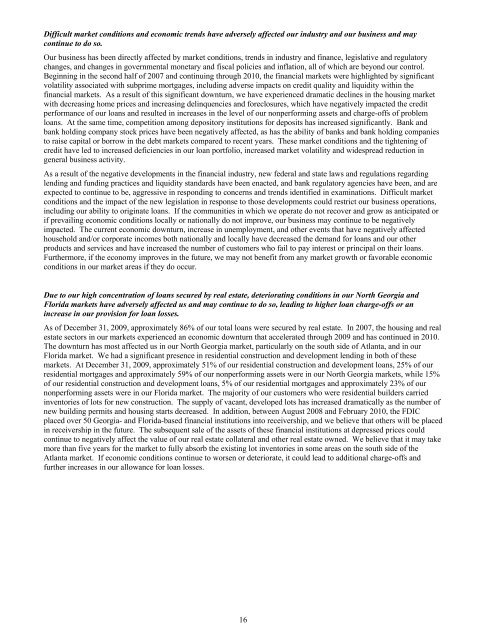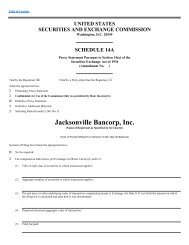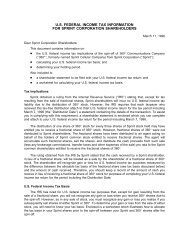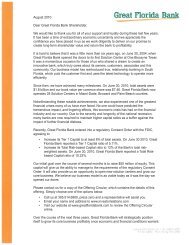pab bankshares, inc. - SNL Financial
pab bankshares, inc. - SNL Financial
pab bankshares, inc. - SNL Financial
Create successful ePaper yourself
Turn your PDF publications into a flip-book with our unique Google optimized e-Paper software.
Difficult market conditions and economic trends have adversely affected our industry and our business and may<br />
continue to do so.<br />
Our business has been directly affected by market conditions, trends in industry and finance, legislative and regulatory<br />
changes, and changes in governmental monetary and fiscal policies and inflation, all of which are beyond our control.<br />
Beginning in the second half of 2007 and continuing through 2010, the financial markets were highlighted by significant<br />
volatility associated with subprime mortgages, <strong>inc</strong>luding adverse impacts on credit quality and liquidity within the<br />
financial markets. As a result of this significant downturn, we have experienced dramatic declines in the housing market<br />
with decreasing home prices and <strong>inc</strong>reasing delinquencies and foreclosures, which have negatively impacted the credit<br />
performance of our loans and resulted in <strong>inc</strong>reases in the level of our nonperforming assets and charge-offs of problem<br />
loans. At the same time, competition among depository institutions for deposits has <strong>inc</strong>reased significantly. Bank and<br />
bank holding company stock prices have been negatively affected, as has the ability of banks and bank holding companies<br />
to raise capital or borrow in the debt markets compared to recent years. These market conditions and the tightening of<br />
credit have led to <strong>inc</strong>reased deficiencies in our loan portfolio, <strong>inc</strong>reased market volatility and widespread reduction in<br />
general business activity.<br />
As a result of the negative developments in the financial industry, new federal and state laws and regulations regarding<br />
lending and funding practices and liquidity standards have been enacted, and bank regulatory agencies have been, and are<br />
expected to continue to be, aggressive in responding to concerns and trends identified in examinations. Difficult market<br />
conditions and the impact of the new legislation in response to those developments could restrict our business operations,<br />
<strong>inc</strong>luding our ability to originate loans. If the communities in which we operate do not recover and grow as anticipated or<br />
if prevailing economic conditions locally or nationally do not improve, our business may continue to be negatively<br />
impacted. The current economic downturn, <strong>inc</strong>rease in unemployment, and other events that have negatively affected<br />
household and/or corporate <strong>inc</strong>omes both nationally and locally have decreased the demand for loans and our other<br />
products and services and have <strong>inc</strong>reased the number of customers who fail to pay interest or pr<strong>inc</strong>ipal on their loans.<br />
Furthermore, if the economy improves in the future, we may not benefit from any market growth or favorable economic<br />
conditions in our market areas if they do occur.<br />
Due to our high concentration of loans secured by real estate, deteriorating conditions in our North Georgia and<br />
Florida markets have adversely affected us and may continue to do so, leading to higher loan charge-offs or an<br />
<strong>inc</strong>rease in our provision for loan losses.<br />
As of December 31, 2009, approximately 86% of our total loans were secured by real estate. In 2007, the housing and real<br />
estate sectors in our markets experienced an economic downturn that accelerated through 2009 and has continued in 2010.<br />
The downturn has most affected us in our North Georgia market, particularly on the south side of Atlanta, and in our<br />
Florida market. We had a significant presence in residential construction and development lending in both of these<br />
markets. At December 31, 2009, approximately 51% of our residential construction and development loans, 25% of our<br />
residential mortgages and approximately 59% of our nonperforming assets were in our North Georgia markets, while 15%<br />
of our residential construction and development loans, 5% of our residential mortgages and approximately 23% of our<br />
nonperforming assets were in our Florida market. The majority of our customers who were residential builders carried<br />
inventories of lots for new construction. The supply of vacant, developed lots has <strong>inc</strong>reased dramatically as the number of<br />
new building permits and housing starts decreased. In addition, between August 2008 and February 2010, the FDIC<br />
placed over 50 Georgia- and Florida-based financial institutions into receivership, and we believe that others will be placed<br />
in receivership in the future. The subsequent sale of the assets of these financial institutions at depressed prices could<br />
continue to negatively affect the value of our real estate collateral and other real estate owned. We believe that it may take<br />
more than five years for the market to fully absorb the existing lot inventories in some areas on the south side of the<br />
Atlanta market. If economic conditions continue to worsen or deteriorate, it could lead to additional charge-offs and<br />
further <strong>inc</strong>reases in our allowance for loan losses.<br />
16
















